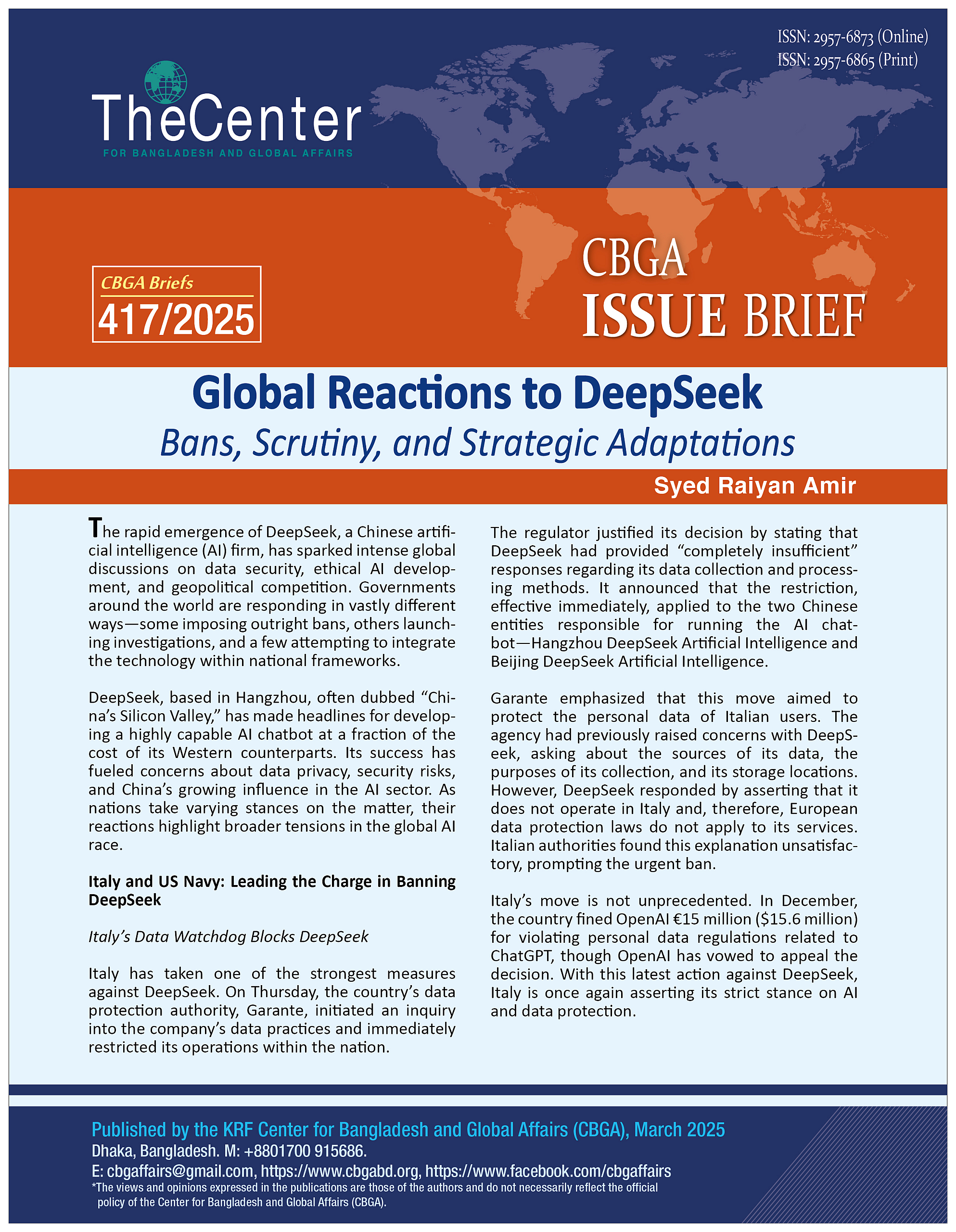
The rapid emergence of DeepSeek, a Chinese artificial intelligence (AI) firm, has sparked intense global discussions on data security, ethical AI development, and geopolitical competition. Governments around the world are responding in vastly different ways—some imposing outright bans, others launching investigations, and a few attempting to integrate the technology within national frameworks.
DeepSeek, based in Hangzhou, often dubbed “China’s Silicon Valley,” has made headlines for developing a highly capable AI chatbot at a fraction of the cost of its Western counterparts. Its success has fueled concerns about data privacy, security risks, and China’s growing influence in the AI sector. As nations take varying stances on the matter, their reactions highlight broader tensions in the global AI race.
Italy and US Navy: Leading the Charge in Banning DeepSeek
Italy’s Data Watchdog Blocks DeepSeek
Italy has taken one of the strongest measures against DeepSeek. On Thursday, the country’s data protection authority, Garante, initiated an inquiry into the company’s data practices and immediately restricted its operations within the nation.
The regulator justified its decision by stating that DeepSeek had provided “completely insufficient” responses regarding its data collection and processing methods. It announced that the restriction, effective immediately, applied to the two Chinese entities responsible for running the AI chatbot—Hangzhou DeepSeek Artificial Intelligence and Beijing DeepSeek Artificial Intelligence.
Garante emphasized that this move aimed to protect the personal data of Italian users. The agency had previously raised concerns with DeepSeek, asking about the sources of its data, the purposes of its collection, and its storage locations. However, DeepSeek responded by asserting that it does not operate in Italy and, therefore, European data protection laws do not apply to its services. Italian authorities found this explanation unsatisfactory, prompting the urgent ban.
Italy’s move is not unprecedented. In December, the country fined OpenAI €15 million ($15.6 million) for violating personal data regulations related to ChatGPT, though OpenAI has vowed to appeal the decision. With this latest action against DeepSeek, Italy is once again asserting its strict stance on AI and data protection.
US Navy Prohibits Use of DeepSeek AI
Across the Atlantic, the United States has also acted swiftly against DeepSeek, with the US Navy officially banning the AI model from use in any capacity. Citing “security and ethical concerns,” the Navy’s Chief Information Officer warned that DeepSeek’s Chinese origins posed potential risks to national security.
The prohibition aligns with broader US efforts to curb China’s influence in critical technologies, particularly artificial intelligence. DeepSeek’s ability to rival US models such as OpenAI’s ChatGPT, despite operating on a significantly smaller budget and using older H800 chips, has heightened concerns in Washington. OpenAI reportedly spent over $100 million on its latest ChatGPT iteration, whereas DeepSeek achieved similar performance with an investment of just $5.5 million.
Market analysts note that DeepSeek’s rise has already caused economic turbulence. Shares of major AI chipmakers, including Nvidia and Broadcom, have dropped by 17 percent, leading to an estimated $800 billion loss in market value.
Former US President Donald Trump, commenting on the development, described DeepSeek as “a wake-up call” for Silicon Valley. He urged American technology companies to prioritize competitiveness. In response, the Trump administration announced a new AI initiative, codenamed Stargate, a joint venture between OpenAI, Oracle, and SoftBank. The project is set to receive substantial funding to bolster AI infrastructure and ensure US dominance in the sector.
European and Asian Nations: Investigating DeepSeek’s Data Practices
France’s Privacy Regulator Scrutinizes DeepSeek
Following Italy’s lead, France’s data protection agency, the Commission Nationale de l’Informatique et des Libertés (CNIL), has announced plans to scrutinize DeepSeek’s operations.
“The CNIL’s AI department is currently analyzing this tool,” stated a spokesperson from the agency. “To better understand how DeepSeek operates and assess the potential risks to data privacy, we will be requesting information from the company”.
France’s inquiry may signal a broader European response, with the European Union considering more stringent regulations to protect citizens’ personal data from foreign technology firms. If concerns over DeepSeek’s data management persist, additional European nations may follow Italy’s example in restricting or banning its operations.
South Korea’s Data Protection Commission to Investigate
South Korea has also moved to examine DeepSeek’s data handling practices. The country’s Personal Information Protection Commission (PIPC) announced plans to question the Chinese AI firm regarding its data collection methods and privacy policies.
The timing of this decision is significant, as DeepSeek’s rapid ascent in the AI sector has impacted South Korea’s technology market. Major South Korean chip manufacturers, including Samsung and SK Hynix, have seen their stock prices decline in response to DeepSeek’s competitive AI advancements.
A PIPC official confirmed that the agency would submit formal inquiries to DeepSeek as early as Friday, seeking detailed information on how user data is processed and stored. The outcome of this investigation could determine whether South Korea imposes regulatory measures or restrictions on the company.
Japan Calls for AI Legislation
In Japan, Prime Minister Shigeru Ishiba has urged lawmakers to introduce legislation addressing both the benefits and risks of AI. While the Japanese government has not imposed restrictions on DeepSeek, it remains cautious about the potential dangers associated with advanced AI technologies.
“We need a comprehensive plan to encourage AI research and development while ensuring safety and security,” Ishiba stated. “Our priority is to draft legislation that maximizes AI’s benefits while minimizing its risks”.
The Japanese government’s approach reflects a balance between fostering innovation and implementing safeguards. Japan’s reluctance to ban DeepSeek outright suggests that it seeks to develop regulatory frameworks that can accommodate foreign AI models while protecting national interests.
India’s Unconventional Approach: Hosting DeepSeek on Local Servers
In contrast to the bans and investigations seen in other nations, India has taken a unique approach. The country’s Information Technology Minister, Ashwini Vaishnaw, announced plans to host DeepSeek’s AI models on domestic servers to address privacy concerns.
“By hosting open-source models on Indian servers, we can mitigate data privacy risks while benefiting from AI advancements,” Vaishnaw stated at an industry conference.
This decision aligns with India’s data localization policies, which require companies to store user data within the country. It also reflects India’s strategic approach to balancing foreign AI adoption with domestic oversight.
DeepSeek’s models will likely be housed at India’s new AI Compute Facility, a major infrastructure initiative aimed at bolstering the nation’s AI capabilities. While India has banned over 300 Chinese apps since 2020 due to national security concerns, it remains open to collaboration with foreign AI companies, provided they comply with local regulations.
Vaishnaw praised DeepSeek’s technological achievement, noting, “You have seen what DeepSeek has done—$5.5 million and a very, very powerful model.” His remarks suggest that India recognizes the significance of cost-efficient AI development and seeks to harness such advancements while maintaining regulatory control.
Beyond DeepSeek, India is heavily investing in AI infrastructure, forging partnerships with global semiconductor firms, and working towards establishing a dedicated AI regulatory body. These efforts indicate that India aims to become a leading player in the global AI landscape while mitigating risks associated with foreign technology.
DeepSeek’s Response and the Future of AI Competition
Despite mounting scrutiny, DeepSeek remains resolute, maintaining that its AI model adheres to international data protection standards. However, the company’s rapid rise has already led to market disruptions and intensified geopolitical competition in the AI sector.
Industry experts warn that the ongoing AI arms race between the US and China is accelerating. As Western nations impose restrictions on Chinese technology firms, China continues to invest heavily in AI research and development, seeking to establish global leadership in the field.
The varied responses to DeepSeek underscore the complexity of balancing AI innovation with security concerns. While some countries, like Italy and the US, have opted for outright bans, others, such as India, are exploring regulatory frameworks that allow AI adoption under national oversight.
As DeepSeek navigates these challenges, the global AI landscape will continue evolving. Whether its journey serves as a breakthrough in democratizing AI or a cautionary tale about escalating technological rivalries remains to be seen. What is certain, however, is that artificial intelligence will remain at the center of international discourse, shaping policies, economies, and strategic alliances in the years to come.
– Syed Raiyan Amir is a Senior Research Associate at the KRF Center for Bangladesh and Global Affairs (CBGA).







